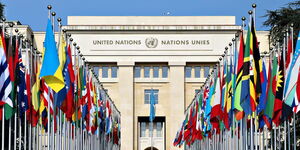Kenya's reputation as a powerhouse in the world of athletics is indisputable. With a legacy of producing world-class runners, the country’s athletes often find themselves courted by foreign nations eager to bolster their sporting prowess.
This phenomenon has given rise to lucrative deals that see Kenyan athletes changing allegiances, motivated by promises of financial stability, better training facilities, and broader international opportunities.
A section of Kenyans have taken to social media to question the reasons behind this phenomenon after Kenyan-born Winfred Yavi scooped gold in the 3000m steeplechase for Bahrain.
According to proponents of the decision to change citizenship and represent foreign countries in competitive events, athletes are always in a catch-22 situation because the local authorities have failed them.
Often, the athletes have complained about poor training fields, corrupt sports officials, unfair remuneration, and dismal treatment and facilitation during competitive events, among other issues.
Punitive taxes on winnings have also played a key role in giving the foreign nation an upper hand in terms of bargaining with the athletes to shift camp.
Singapore is among the top countries paying huge bonuses amounting to Ksh97 million.
Azerbaijan will pay Ksh66 million followed by Bahrain’s Ksh64.6 million while Indonesia will cough up Ksh49.5 to reward their gold conquering champions.
Others in the top 10 paying league are Thailand Ksh40.6 million, Kazakhstan Ksh32.3 million, Kyrgyzstan Ksh25.8 million, Latvia Ksh24.5 million, Italy Ksh24 million, while Uzbekistan, Belarus and Ukraine will each pay Ksh19.4 million.
In addition to the individual bonuses, countries like South Korea offer military exceptions to Olympic gold medallists, while in Germany, successful athletes receive a lifetime supply of free beer at their discretion.
High-profile cases such as Winfred Yavi, Leonard Korir, and Lonah Chemtai Salpeter illustrate this growing trend.
Winfred Yavi - Bahrain
Winfred Yavi, a remarkable steeplechaser, is one of the most notable athletes to switch allegiances and a star in this year's Paris 2024 Olympics where she scooped a gold medal.
Originally from Kenya, Yavi now competes for Bahrain. Her transition was marked by the promise of substantial financial support and advanced training facilities, which have allowed her to excel on the global stage.
Bahrain’s investment in Yavi is part of a broader strategy to enhance its presence in international athletics, leveraging the exceptional talent of Kenyan runners.
Yavi’s journey underscores the appeal of switching national allegiances. Beyond financial incentives, the opportunity to train in world-class facilities and receive top-tier medical support are significant draws.
Ruth Chebet - Bahrain
Ruth Jebet, a Kenyan who switched nationality in 2013 when she was 16, won the 3,000m steeplechase and received a Ksh65.6 million bonus. Jebet received a cool Ksh64.6 million from the Bahrain Government as opposed to the Ksh1 million that the Kenyan government awarded its gold medal winners.
Eunice Jepkirui Kirwa - Bahrain
Eunice Jepkirui Kirwa switched her allegiance to Bahrain in 2013, after initially representing Kenya in her youth.
She won a silver medal in the marathon at the 2016 Rio de Janeiro Olympics, but her career faced a setback in 2019 due to a doping suspension.
Samuel Wanjiru - Qatar
In a story published by the New Yorker Magazine, Kenya’s Olympic marathon champion in 2008, Samuel Wanjiru, revealed to his training partner and friend Daniel Gatheru that he had considered taking Qatari nationality in exchange for a substantial salary.
Although he ultimately remained with Kenya, Wanjiru's consideration highlights the financial allure presented by foreign nations.
Stephen Cherono - Qatar
Until the age of 20, Stephen Cherono was a celebrated Kenyan athlete.
However, in 2003, he accepted a deal from Qatar that included a Ksh112,300 monthly stipend for life, changing his name to Saif Saeed Shaheen.
Cherono's switch marked a significant loss for Kenya, as he had set world records in both the steeplechase and the 5,000m.
Leonard Korir - USA
Leonard Korir's move to represent the United States highlights another facet of this trend. A long-distance runner with impressive credentials, Korir made the shift after attending university in the U.S. on a scholarship.
The allure of American citizenship, coupled with access to extensive training resources and competitive opportunities, made the decision compelling.
Korir’s case reflects the strategic investments made by American institutions in nurturing foreign talent through their academic sponsorship programmes that scout different talents and academic prowess.
By offering scholarships and a pathway to citizenship, the U.S. effectively integrates top-tier athletes into its national sports programs.
Lonah Chemtai Salpeter - Israel
Born in Kenya, Chemtai began her running career before moving to Israel.
Her transition was initially driven by personal reasons, but the subsequent support from the Israeli athletic federation solidified her new allegiance.
The combination of personalised coaching, advanced sports science, and financial incentives provided a robust foundation for her success.
Chemtai’s achievements for Israel have been substantial, bringing international acclaim to the nation.
Her success underscores the benefits of comprehensive support systems that go beyond financial incentives, including emotional and psychological backing, which are crucial for peak athletic performance.
Bernard Kipchirchir Lagat - USA
Bernard Kipchirchir Lagat had a successful career representing Kenya from 2000 to 2004, including a top-three world ranking in the 1500m race during the 2000 Sydney Olympics.
However, in March 2005, Lagat became a U.S. citizen, a decision that shocked many Kenyans.
His new allegiance allowed him to win multiple medals for the United States in subsequent international competitions.
Anne Wafula - United Kingdom
Anne Wafula’s journey to the United Kingdom is another testament to the opportunities foreign citizenship can offer.
Despite becoming disabled at an early age, Wafula pursued athletics and became a British citizen in 2006.
This enabled her to join Team GB and embark on a successful career, culminating in being awarded the Order of the British Empire (MBE) in 2014 for her services to disability sport and charity work.
Janeth Jepkosgei Busienei - Kenya
Janeth Jepkosgei Busienei, known as Eldoret Express, attempted to switch to Bahraini citizenship but was unsuccessful.
During an interview, she recounted how her mentor tore up her papers, urging her to continue training for future events under the Kenyan flag.
These cases reflect the high value placed on Kenyan athletic talent and the significant investments foreign nations are willing to make.
While these deals bring individual success and recognition, they also spark debates about national identity and the ethics of such transitions.
Critics argue that this trend commodifies athletes, reducing them to assets for national glory, while proponents contend that these opportunities provide deserving athletes with a chance to achieve their dreams and secure their futures after disheartening experiences with local sports authorities.












